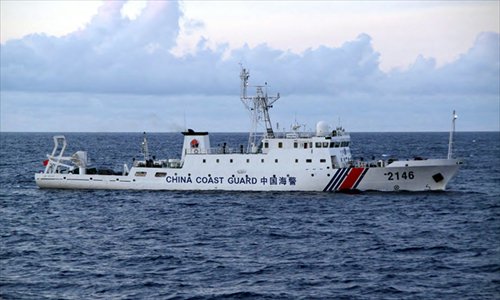
by Admin | Jun 9, 2014 | News

(Photo Credit: AFP/Japan Coast Guard)
(BGF) – In this article, featured in The Washington Post, M. Taylor Fravel and Alastair Iain Johnston, professors at MIT and Harvard University, respectively, analyze recent data on the frequency of Chinese coast guard patrols off the disputed Senkaku/Diaoyu Islands. According to the data released by the Japanese Coast Guard, Chinese patrols in the territorial waters off the disputed islands have decreased since October 2013. While the authors are careful not to infer too much from the data, they lay out three possible conclusions that could be drawn, including the possibility that China’s decreased patrols indicate a willingness to de-escalate the tensions with Japan. Click here to read the full article or visit The Washington Post‘s website.
Chinese Signaling in the East China Sea?
By M. Taylor Fravel and Alastair Iain Johnston
The dispute between Japan and China over the sovereignty of the Senkaku/Diaoyu Islands is one of the most volatile flashpoints in East Asia today. After the Japanese government purchased three of the contested rocks from a private Japanese citizen in September 2012, China began to use its coast guard to conduct regular patrols within the 12-nautical-mile territorial waters around the islands. These patrols have contributed to frictions in the Sino-Japanese relationship because they directly challenge Japan’s claim to sovereignty and administrative control. By increasing the number of ships in contested waters, China’s patrols also increase the risk of a collision or other accident that could escalate into an armed conflict between the region’s largest economies.
Daily records published by the Japanese Coast Guard on Chinese patrols suggest an intriguing change in the pattern of Chinese behavior since last fall. Although we are reluctant to infer too much about China’s bargaining strategies from these data alone, China’s history of crisis management and coercive diplomacy suggest that tactical, on-the-ground behavior offer one important means for signaling either escalation or de-escalation.
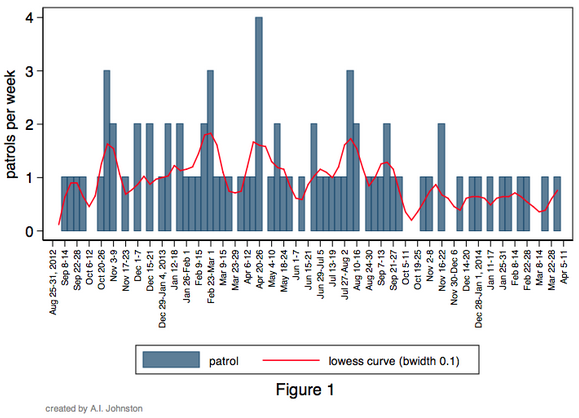
As Figure 1 shows, since October 2013 there has been a substantial decline in the frequency of Chinese patrols within the territorial waters of the Senkaku/Diaoyu Islands. Prior to that China conducted as many as four patrols per week within the islands’ territorial waters. Yet in October, more than three weeks passed in which no patrols occurred in the 12-mile zone (Oct. 2-27). Since then (our data is current as of April 4), the frequency of patrols has dropped and maintained a fairly steady average of about one patrol into the 12-mile zone every couple of weeks.
A few simple statistical tests support our observation that a shift in Chinese behavior has occurred. A Zivot-Andrews test used to identify statistical cutpoints in time series data confirms that in early October a basic change in the frequency of patrols occurred. Likewise, a comparison of the average weekly number of patrols within the territorial waters before and after October 2013 further supports this conclusion. Figure 2 shows a statistically significant decline in the frequency of patrols into the 12-mile zone after Oct. 1, 2013 (t=2.99 p=0.004, two-tailed). Note that the patrols inside the territorial waters have dropped by about half.
Click here to continue reading.
by Admin | Jun 9, 2014 | News
(BGF) – In a news conference, Foreign Secretary Albert del Rosario told that the Philippines submitted documents, consist of nearly 4,000 pages of analysis and documentary evidence, to the tribunal in The Hague against China’s territorial claims in the South China Sea, ignoring the China’s warning that the case will damage the bilateral relations. Chinese Foreign Ministry spokesman Hong lei also said China will “never accept nor participate in the international arbitration pushed by the Philippines”, Teresa for the Associated Press reported.
Click here to read the full story or visit the AP website.
Philippines files evidence against China’s claims
March 30, 2014 | By Teresa Cerojano
MANILA, Philippines (AP) — The Philippines presented evidence to an international tribunal against China’s sweeping territorial claims in the South China Sea, ignoring Beijing’s warning that the case will damage ties.
Foreign Secretary Albert del Rosario told a news conference Sunday that the documents submitted electronically to the tribunal in The Hague consist of nearly 4,000 pages of analysis and documentary evidence.
Filipino officials took their territorial disputes with China to international arbitration in January 2013, after Chinese government ships took control of a disputed shoal off the northwestern Philippines. They asked the tribunal to declare China’s claims to about 80 percent of the strategic waters and Beijing’s seizure of eight South China Sea shoals and reefs illegal.
Chinese Foreign Ministry spokesman Hong Lei said last week that China will never accept nor participate in the international arbitration pushed by the Philippines. He called on the Philippines “to stop going any further down the wrong track so as to avoid further damage to bilateral relations.”
Click here to continue reading.
by Admin | Jun 9, 2014 | News
(BGF) – China’s new law that requires foreign fishermen to seek Beijing’s approval to operate in disputed waters of the South China Sea, increased tensions with Vietnam and the Philippines. The U.S. has also criticized China’s move, calling it “provocative and potentially dangerous.”, according to the Fox News.
Click here to read the full article or visit the Fox News website.
Philippines, Vietnam condemn China’s new fishing law that reinforces claim on South China Sea
January 10, 2014
(MANILA, Philippines) – The Philippines and Vietnam have condemned China’s new law that requires foreign fishermen to seek Beijing’s approval to operate in much of the South China Sea, where overlapping territorial claims have increased tensions.
The Philippine Department of Foreign Affairs said in a statement Friday that the new regulation “escalates tensions, unnecessarily complicates the situation in the South China Sea, and threatens the peace and stability of the region.”
Vietnam’s Foreign Ministry spokesman Luong Thanh Nghi said a statement late Thursday that Hanoi has “undisputable” sovereignty over the Spratly and Paracel islands, and that “all foreign activities in these areas without Vietnamese acceptance are illegal and invalid.”
Click here to continue reading.
by Admin | Jun 9, 2014 | News
(BGF) – China defended its new fishing rules in Hainan province by saying that it is “totally normal”, and that it is in accordance to the national law to “regulate conservation, management and utilization of maritime biological resources”, the Voice of America reported.
Click here to read the full article or visit the Voice of America website
China Defends New Fishing Rules in Disputed Waters
January 9, 2014
(VOA, Washington) – China is defending a move by Hainan province to require all foreign fishing vessels to seek permission before entering disputed waters in the South China Sea that are claimed by Beijing.
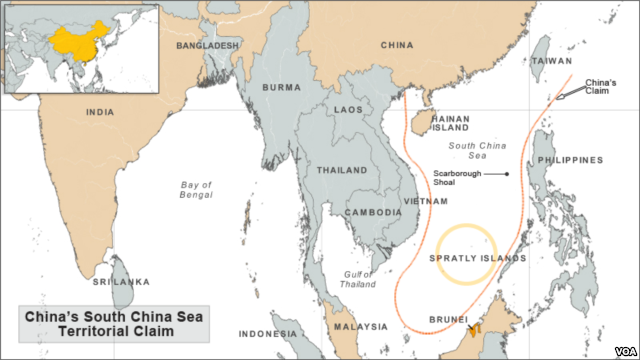 (Photo Credit: South China Sea Dispute Map by VOA News)
(Photo Credit: South China Sea Dispute Map by VOA News)
The new rule, which went into effect on January 1, covers more than half the 3.5 million square kilometers of the South China Sea.
Chinese Foreign Ministry spokeswoman Hua Chunying Thursday said the move is unremarkable.
He said, “China is a maritime nation, so it is totally normal and part of the routine for Chinese provinces bordering the sea to formulate regional rules according to the national law to regulate conservation, management and utilization of maritime biological resources.”
Su Hao, a professor at China Foreign Affairs University, says the new rules should not be seen as a major change.
“First of all, China’s regulations of the South Sea fishing region in reality is taking a formerly customary thing and clarifying them a little bit, that’s all. Furthermore [it] lacks substantive exclusive provisions,” said Hao. “In other words, [it] only stipulates that China has its own rights in these places and that Chinese law enforcement vessels can go to these places to perform regular cruises. However, that is not to say that other nation’s ships cannot go in, or that other nation’s fishermen cannot go in. It’s merely taking facts that previously existed and clarifying them, that is all.”
An official representing Vietnamese fishermen said his country will lodge a protest against China’s latest move in the disputed South China Sea.
Click here to continue reading.
by Admin | Jun 9, 2014 | News
(BGF) – In a commentary issued by Chinese People’s Daily, it accused the Philippines of making the Association of Southeast Asian Nations an “accomplice” in the “violation” of China’s “sovereignty” over some islets and shoals in the West Philippine Sea; “illegal occupation” of the Kalayaan Island Group, inviting foreign companies to engage in oil and gas development in the disputed waters and internationalizing the territorial conflict. China also threaten the Philippines by saying that “a counterstrike will be hard to avoid.”
The Philippines Department of Foreign Affairs official called China to be “responsible member in the community of nations”. Defense Secretary Voltaire Gazmin also advised Beijing to be more cautious and not to use “intimidation and coercion” in settling disputes with the Philippines and its neighbors, as Jaime Laude for the Philippine Star reported.
Click here to read the full story or visit the Philippine Star website.
Gazmin on China threat: Irresponsible
July 2, 2013 | By Jaime Laude
MANILA, Philippines – Beijing was being “irresponsible” by threatening a “counterstrike” in response to the Philippines’ offering its allies access to its air and naval facilities, Defense Secretary Voltaire Gazmin said yesterday.
Gazmin said that while he is not worried about China’s threat, he is exhorting Beijing to be more circumspect and not to resort to intimidation and coercion in settling disputes with the Philippines and its neighbors.
Gazmin issued the statement shortly before flying to Clark air base to attend the celebration of the 66th anniversary of the Philippine Air Force.
On Saturday, the People’s Daily – the mouthpiece of the ruling Chinese Communist Party – said the Philippines was inviting a counterstrike for “provoking” Beijing.
In a commentary, the newspaper also accused the Philippines of making the Association of Southeast Asian Nations an “accomplice” in the “violation” of China’s “sovereignty” over some islets and shoals in the West Philippine Sea.
Gazmin said he agrees with Foreign Affairs Secretary Albert del Rosario’s reprimanding Beijing and reminding it of the preeminence of international law in settling issues.
Del Rosario had also said China’s provocative statement had no place among civilized nations.
DFA spokesman Raul Hernandez said China is obliged under international laws, specifically the United Nations Charter, “to pursue a peaceful resolution of disputes – meaning without the use of force or the threat to use force.”
Click here to continue reading.
by Admin | Jun 9, 2014 | News
(BGF) – The Philippine Star reported on May 22 that the Philippines called on China to respect the sovereign rights and jurisdiction of the Philippines over its continental shelf, including the waters around the Ayungin shoal after detecting Chinese fishing vessels encroached in its exclusive economic zone, and escorted by a naval ship.
The Philippines filed a diplomatic protest with the Chinese embassy in Manila on the provocative and illegal presence of Chinese government ships (two CMS and one warship) around Ayungin Shoal.
Click here to read the full story or visit the Philippine Star website.
China sends ships to another Phl shoal
May 22, 2013 | By Pia Lee-Brago and Alexis Romero
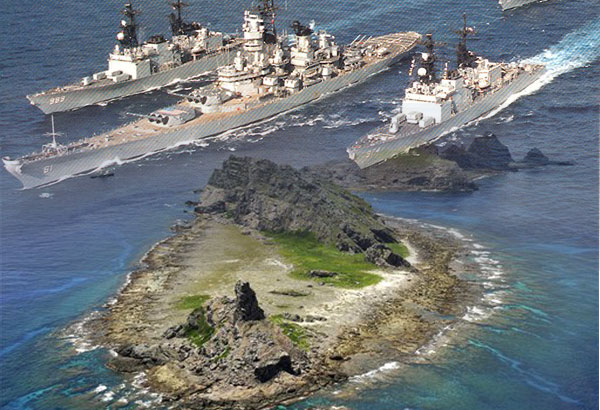
(Photo Credit: the Philippine Star)
MANILA, Philippines – The Philippines has filed a protest against what it describes as the “provocative and illegal” deployment of Chinese ships around Ayungin Shoal, which is part of the Kalayaan Island Group off Palawan.
“On May 10, 2013, we filed with the Chinese embassy in Manila our protest on the provocative and illegal presence of Chinese government ships (two CMS and one warship) around Ayungin Shoal,” Department of Foreign Affairs (DFA) spokesman Raul Hernandez said yesterday.
Hernandez said Ayungin Shoal is an integral part of the Philippine national territory. It is located 105.77 nautical miles from Palawan and constitutes part of the 200 nautical miles of the Philippine continental shelf under the United Nations Convention on the Law of the Sea (UNCLOS).
“We have already told them our position regarding these vessels which have intruded in our exclusive economic zone,” Hernandez said.
The Philippines called on China to respect the sovereign rights and jurisdiction of the Philippines over its continental shelf, including the waters around the shoal.
“China’s interference with the sovereign rights and jurisdiction over the West Philippine Sea is a violation of international law particularly UNCLOS, the United Nations Charter and the DOC (Declaration on the Conduct of Parties in the South China Sea),” Hernandez said.
Click here to continue reading.
by Admin | Jun 9, 2014 | News
(BGF) – The Philippines’ Deputy Director-General of the National Security Council Secretariat said about 18 Chinese maritime surveillance ships operating in the Philippines area, which raises the need to pour more resources into the budget for defense spending, as Alexis Remero reported for the Philippine Star.
Click here to read the full story or visit the Philippine Star website.
18 Chinese maritime ships operating within Philippine territory
June 13, 2013 | by Alexis Remero
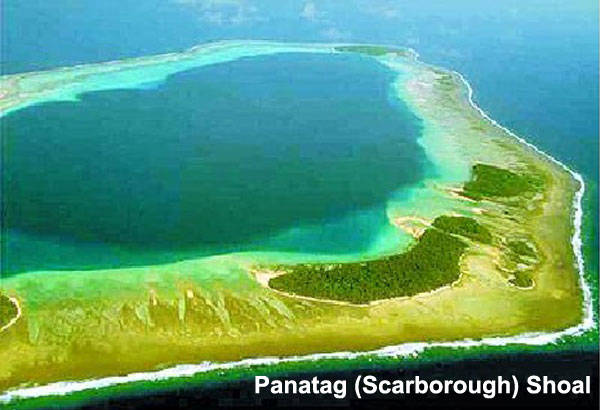
(Photo Credit: the Philippine Star)
MANILA, Philippines – About 18 Chinese vessels are intruding into Philippine territory, raising the need to pour more resources to defense spending, a security official said Thursday.
Vicente Agdamag, Deputy Director-General of the National Security Council Secretariat, said the deployment of the ships is in line with China’s aim to consolidate its control over the West Philippine Sea.
“Right now, there are 18 maritime surveillance ships operating in our area,” Agdamag said during the Air Force’s Air Power Symposium 2013 in Pasay City.
Agdamag did not say what types of ships were deployed and where they are located. He, however, enumerated incidents showcasing China’s aggressive behavior in the West Philippine Sea.
These include the imposition by China of an “exclusion zone” in Panatag (Scarborough) Shoal, which is well within the Philippines’ exclusive economic zone.
Headlines ( Article MRec ), pagematch: 1, sectionmatch: 1
The shoal, also known as Bajo de Masinloc, is 124 nautical miles from the nearest point in Zambales province.
Click here to continue reading.
by Admin | Jun 9, 2014 | News
(BGF) – Tensions escalated as China enforced a new regulation requiring foreign fishermen to obtain Beijing’s permission before operating in South China Sea, particularly on waters close to China that are also claimed by Vietnam. Hanoi reacted, and insisted its claim that ” any foreign activities not approved by Vietnam in this area are illegal and invalid.” The Philippines Department of Foreign Affairs said this development “threaten the peace and stability of the region”, the Wall Street Journal reported.
Click here the read the full article or visit the Wall Street Journal website.
China Sea Rules to Raise Tensions With Vietnam
Jan. 10, 2014 | By Brian Spegele in Beijing
(The Wall Street Journal) —Enforcement of China’s new regulation requiring foreign fishermen to obtain Beijing’s consent before operating in the disputed South China Sea will focus on waters close to China that are also claimed by Vietnam, an official said, potentially setting China on a collision course with Hanoi.
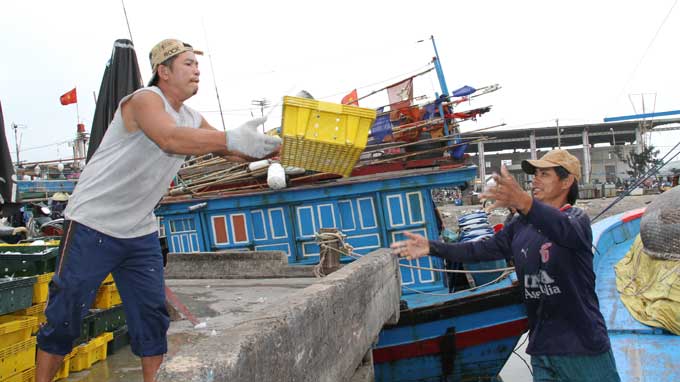 (Photo Credit: Tuoi tre Newspaper)
(Photo Credit: Tuoi tre Newspaper)
The regulation, which was enacted by China’s island province of Hainan on Jan. 1, is the latest effort by Beijing to bolster territorial claims and is adding to tensions over contested islets, freedom of navigation and rights to fisheries and other resources in a sea vital to world trade. The Philippines and Vietnam this week criticized the measure, as has the U.S. State Department, which called it “provocative and potentially dangerous.”
In recent months, China has stepped up muscle-flexing over its territorial claims, declaring an air-control zone over the East China Sea that aggravated a dispute with Japan and challenged a fledgling thaw with South Korea. The latest moves in the South China Sea increases prospects for further standoffs with its southern neighbors.
Wu Shicun, a delegate to Hainan’s legislature and former head of the province’s foreign-affairs office, said Friday that the measure in principle applied to China’s entire territorial claim in the South China Sea, which extends to near the coasts of the Philippines and Malaysia.
In practice, however, Mr. Wu said that Chinese enforcement would focus on policing the waters near the Paracel Islands, just south of Hainan, and not farther away. Mr. Wu said punishments—likely including fines and the seizure of catches—would be strengthened against fishermen who entered the area without permission. He said Vietnam has been encouraging its fishermen to enter the area.
“The goal is to make them not dare to come back,” said Mr. Wu, who is also president of the National Institute for South China Sea Studies. “If you violate the rules, you will pay a high price.” He said the U.S. had grown too worked up about the new measure, which he said was aimed at better regulating the fishing industry.
China has exercised de facto control of the Paracels after ousting Vietnam in a naval battle in 1974 and has since built up a sizable government and military presence.
Hanoi hasn’t relinquished its claim. Luong Thanh Nghi, spokesman for Vietnam’s Foreign Ministry, reiterated Friday that Vietnam had “indisputable sovereignty” over the Paracels and Spratlys, another island group farther to the south, claimed in part or full also by China, the Philippines and others. “Any foreign activities not approved by Vietnam in this area are illegal and invalid,” he said, in response to a media query.
Other South China Sea claimants include Malaysia, Brunei and Taiwan. Verbal sparring and outright confrontations have been on the rise in recent years as a more powerful China asserts claims it has long made on paper and as other countries resist. In March, Vietnam accused China of firing on a Vietnamese fishing boat operating near the Paracels. China’s Defense Ministry later said Chinese sailors fired two flares as a warning and hadn’t attacked the Vietnamese.
On Friday, the Philippines Department of Foreign Affairs said it was “gravely concerned” by the new regulation. “This development escalates tensions, unnecessarily complicates the situation in the South China Sea, and threatens the peace and stability of the region,” the statement read.
Click here to continue reading
by Admin | Jun 9, 2014 | News
(BGF) – In a response to China’s controversial claims over Paracel and Spratly Islands, Thang Tran, President of The Institute for Vietnamese Culture & Education (U.S) announced that he has a collection of 150 maps that were published in England, America, France, Germany, Scotland, etc. for 400 year during 1626- 2008, in which shows that the Paracel Islands belong to Vietnam.

Mr Tran said the map dimensions vary from 8” x 10” (20cm x 25cm) to 24” x 30” (60cm x 75cm). In the collection, 80 maps indicate that south of China is Hainan Island and 50 maps show that the Paracel Islands belong to Vietnam.
He shared on his websites that he found two atlases of the Republic of China published by the Republic of China’s Ministry of Transportation in 1919 & 1933 and one Atlas of The Chinese Empire published by the China Inland Mission in 1908. The atlas edition in 1908 contains 23 maps; the atlas edition in 1919 contains 49 maps; the atlas edition in 1933 contains 29 maps. The dimensions of the atlas edition in 1919 & 1933 books are 62cm x 38cm x 4cm. All three books do not list the Paracel and Spratly Islands on the map and index page.
Recently, China established a local government and military base on Woody Island, part of the Spratly Islands. Vietnam claims its sovereignty over the Woody Islands.
He donated his entire map collection to the Da Nang Institute for Socio-Economic Development for their research on the Paracel and Spratly Islands.






